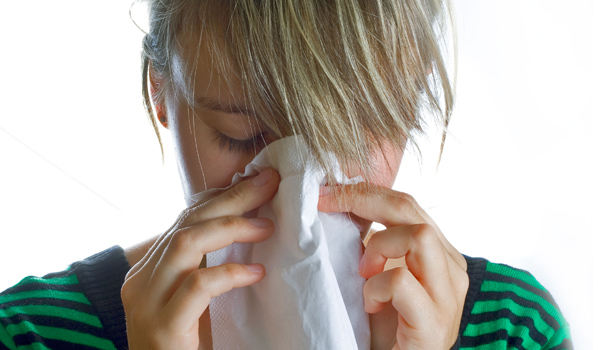'Stealth Transmitters' of the Flu Activate Different Genes

Whenever the flu hits the office, some people always seem to fall sick while others just a cubicle away sail through unharmed. Our genes may be why, a new study says.
A small study to be published Friday (Aug. 26) in the journal PLoS Genetics showed a difference in gene activity between people who become ill with the flu and those who contract the virus and show no symptoms, but can still transmit the virus to others.
Researchers at Duke University and the University of Michigan recruited 17 healthy people who volunteered to be exposed to a flu virus and to have their immune systems' responses measured.
The group was infected with the H3N2/Wisconsin strain of flu and gave blood samples every six to eight hours afterward. For five days, researchers screened the samples for signs of activity in genes known to be related to immunity.
Nine of the volunteers came down with mild to severe flu, even though the blood tests confirmed that all 17 were infected and making antibodies against the virus .
The symptom-free volunteers showed activity in genes performing antioxidant and anti-inflammatory functions, but their bodies' acute inflammatory responses were not active, said Alfred Hero, a co-author of the paper.
Meanwhile, blood samples from the sick volunteers showed different, or even opposite, gene activity, Hero said.
Sign up for the Live Science daily newsletter now
Get the world’s most fascinating discoveries delivered straight to your inbox.
Immune to the flu
"We got really a full picture of the evolution of their immune response," said Hero, a professor of engineering at the University of Michigan. Researchers even could see a difference in gene activity between symptomatic and asymptomatic volunteers 36 hours before the sniffles, aches, pain and fever hit.
"We now have opened the door to understanding what active immune response causes us not to get sick ... down to the level of particular types of genes and their particular response patterns," he said.
Hero and his colleagues wanted to measure people's innate reactions to a flu infection , rather than how people fare after building immunity to a flu strain. To do this, the researchers studied only patients who hadn't received a flu vaccination for at least three years. They took a blood sample from each volunteer before infecting them, to establish their baseline immune activity.
"We controlled for a lot of things; this was a very careful study, that's why we're confident that what we're viewing, and these differences that we're seeing, are due to innate immune response and not other factors," Hero said.
He noted, however, that some people could have been tired or stressed before the study's start, which might have increased their susceptibility to getting sick.
A blood test, before you get sick?
Hero acknowledged that his study was too small to establish a model for flu tests but said he hoped it might lead one day to blood tests that predict who will get sick with the flu and to treating patients before their symptoms become severe.
Dr. William Schaffner, chairman of preventive medicine at Vanderbilt University School of Medicine, agreed the study was too small to draw conclusions. But Schaffner called the study provocative and said the findings support a long-held observation that some people are simply more susceptible than others to new viruses.
"It should be noteworthy that even if they were infected with the virus, they had no symptoms," Schaffner said.
Infected but asymptomatic people can unwittingly spread the flu virus. "We might call the people who have the very strong immune systems, who are less likely to be sick, 'the stealth transmitters,'" said Schaffner.
He said the study should encourage more people to get flu shots .
Pass it on: People who don't get sick when exposed to the flu have more activity in genes with antioxidant and anti-inflammatory functions.










